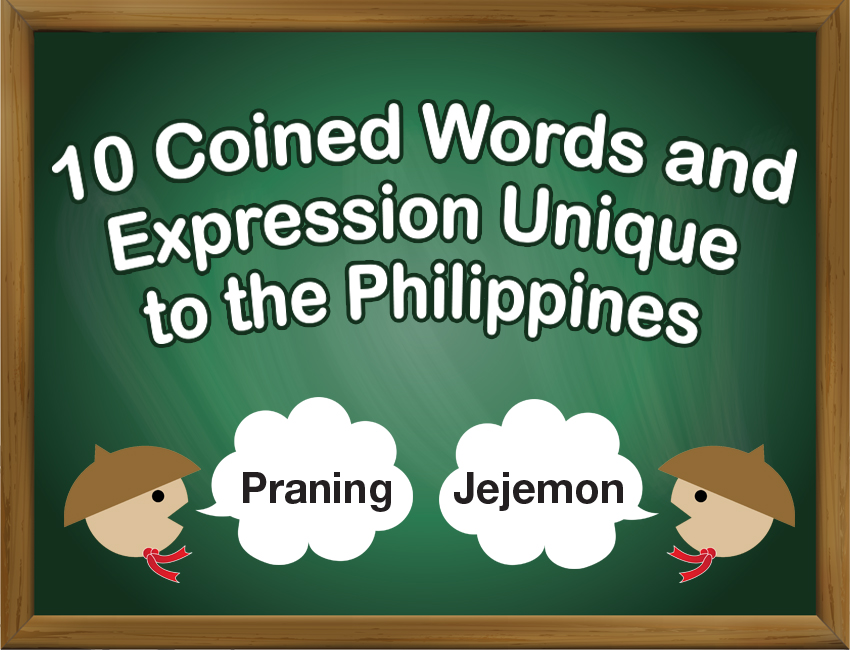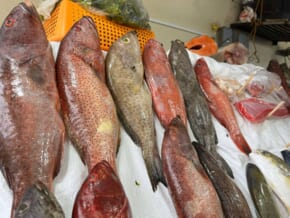Coined Words and Expression Unique to the Philippines

Time and again, a new word dominates the streets and is eventually heard in every corner of the town. Once it’s used on television, it slowly penetrates the consciousness of every Filipino. Words, expressions and acronyms of questionable origins emerge to become part of the growing, colorful Filipino language. Proving that the Filipino imagination knows no limits and boundaries, the evolution of our language can range from normal street terms derived from pop culture, to bekinese or gay lingo. One can say the invention of words is coupled with the culture that mirrors what these words mean. Here are ten words any local or foreigner must have heard at least once, reflecting a culture that is uniquely Filipino:
1. Praning
Used by mothers to describe daughters who have gone berserk over a celebrity crush or matinee idol, praning is known as the Tagalog slang equivalent for ‘paranoid’ or being in the state of paranoia. It can also be used as a synonym for ‘crazy’ when in stressful everyday situations.
2. Churva
One of the infamous words deriving from the evolving language of bekinese or bekimon, it has become part of everyday usage especially between women sharing amusing stories, or to tone down the seriousness of the topic at hand. Together with chuva and ek-ek, it can be posed as a question when out to find or clarify something.
3. Chugi/Tsugi
Another borrowed term from gay lingo, it generally means “kill”. Sometimes, it is used along the lines of something or someone nearing its end. It is said to be loosely based on the sound made by a sharp weapon, most often a knife in Filipino comics.
4. In fairness
A variation of “to be fair”, in fairness is used before a compliment after a given criticism of something or someone. The use can sometimes be associated with how the word ‘actually’ is used in sentences. “In Fairview”, an area in Quezon City, is used as an alternative for good humor.
5. Ngek!
The old-fashioned exclamation of surprise, ngek is the equivalent of the Western yikes and is often the reaction over corny jokes and pilit or ‘forced’ puns by fellow classmates… or your dad.
6. Jejemon
Chosen as the “Word of the Year” back in 2010, it is said to refer to the lower class that the elite considers as baduy or out-of-style. It is the modern-day equivalent of jologs, still used by certain age groups.
7. Bagets
The youth-oriented program of the same name gave rise to the origin and rise to popularity of this term. Derived from another slang term(bagito), bagets refers to the teenagers of any generation, with the oldies called the opposite: forgets.
8. Anyare/Ansabe
Short for “Ano’ng nangyari?” and “Ano’ng sinabi mo?”, these words are proof of the Filipinos’ love for verbal shortcuts. Using this expression does not necessarily mean asking for an answer; rather it is posed as a rhetorical question about what happened or what was said.
9. Push mo ’yan
An informal translation of “go for it”, it has become an expression showing support or expressing encouragement to someone. Be warned: its meaning depends entirely on how it is said.
10. Pabebe
Coined no more than two years ago, it is an adjective for people trying to be cute: be it acting, speaking or sounding like a child or a baby (hence, the –bebe part). It gained popularity when it was used by the phenomenal television loveteam Aldub that features Maine Mendoza (popularly known as Yaya Dub) and Alden Richards, a local actor. Other than being cute, it can also carry a negative meaning, bringing to mind a person wanting to be the center of attention most of the time.
With these new words in your vocabulary arsenal, no one will mistake you for a tourist. The Filipino language is as flexible as it gets, and is close to the heart of each and every Filipino.
![]()
Article by Arvee Gomez
Sources:
11 Filipino Slang Words With Surprising Origins. (n.d.). Retrieved from http://www.filipiknow.net/filipino-slang-words-origins/
Maog, E. (2014, August 27). Ansabeh? ‘AngPinaka’ lists popular Pinoy expressions for 2014. Retrieved from http://www.gmanetwork.com/news/story/376664/newstv/angpinaka/ansabeh- ang-pinaka-lists-popular-pinoy-expressions-for-2014
Tenorio Jr., B. (2012, September 9). Let’s talk baklese. Retrieved from http://www.philstar.com/allure/2012-09-09/846807/lets-talk-baklese
Teodoro, J. (2010, August 10). Why jejemon was chosen as Word of the Year. Retrieved from http://www.gmanetwork.com/news/story/198212/lifestyle/artandculture/why-jejemon-was-chosen-as-word-of-the-year













